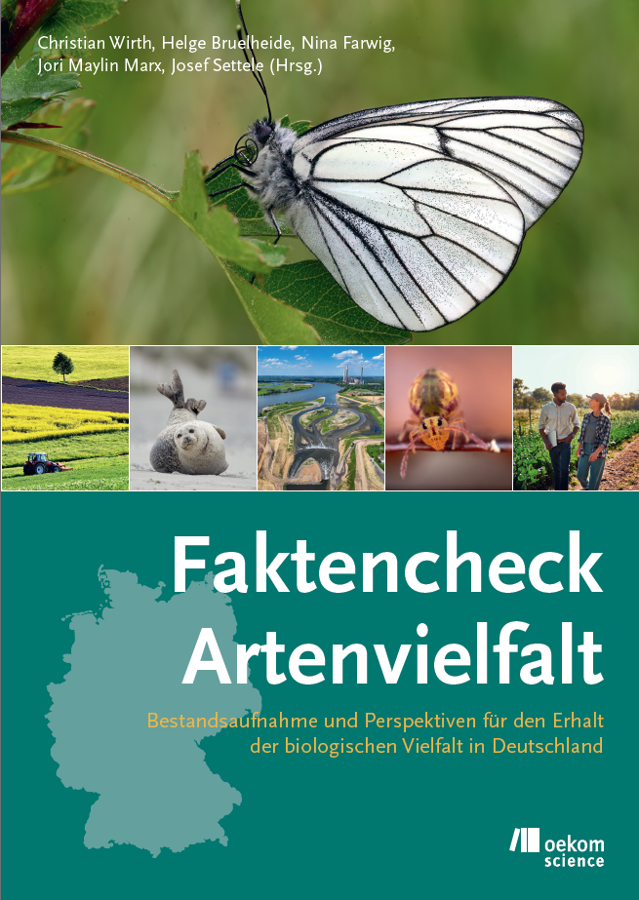Editors’ Choice
Faktencheck Artenvielfalt – First comprehensive assessment of German biodiversity
By Jori Maylin Marx (UL, iDiv alumna), Christian Wirth (UL, iDiv Member), Helge Bruelheide (MLU, iDiv Member), Josef Settele (UFZ, iDiv Member), Julia Ellerbrok & Nina Farwig (both University of Marburg)


On October 1st, we published the first comprehensive assessment of German biodiversity, the “Faktencheck Artenvielfalt”. The assessment compiles what is known about the current status and trends of biodiversity, what influences these trends, which measures work to protect and improve biodiversity, and what societal transformations are necessary for this to happen. The report highlights the alarming decline in various species groups across Germany’s main habitat types but also notes some positive trends while highlighting our many knowledge gaps. It also emphasises the importance of sustainable land use practices for bending the curve of biodiversity loss. Overall, the “Faktencheck Artenvielfalt” can serve as a comprehensive resource for understanding the challenges and opportunities in safeguarding Germany’s biodiversity.
“Faktencheck Artenvielfalt” is the product of 3.5 years of work in cooperation with around 145 authors, many more contributors, and reviewers. Working with all of them was great fun but also time-consuming. As in similarly large cooperative projects, it was our task – the core team – to find a common language across disciplines, to harmonise writing styles, to dissolve disputes, and not least, to keep deadlines. It was a great moment when we finally held the 3.7 kg book in our hands.
This monumental task was not only a challenge but also a very enriching and inspiring experience. We consider ourselves absolutely lucky to be part of this very diverse and enthusiastic group of experts, comprising natural scientists and social scientists, theoreticians and practitioners, bird watchers and flower counters, soil diggers and plankton samplers. Regular meetings in chapter groups and in plenary, inspiring workshops and countless Zoom meetings helped us keep track of each other.
When the books were printed, it was time to spread the word, beginning with a celebratory event in Berlin on the eve of the release. With a choreographed group performance involving eleven speakers, we presented our books and key results to over 100 guests and many more online. It was also a chance to meet fellow authors from all over Germany once again and celebrate the achievement. Due to the efforts of everyone involved, the media campaign was also very successful. We know of about 85 articles in the first week alone, in addition to several radio and TV interviews, as well as podcasts. Christian Wirth even made it into the 8 p.m. Tagesschau news.
In addition to the main report, we created a shorter version for a bit of “lighter” reading, which will be made available in English soon. This summary for policymakers required a special kind of collaboration. Taking the 1,256 pages, drawing out the essentials, and turning them into key messages that are digestible for policymakers required a lot of discussion and negotiation.
Without any doubt, the Faktencheck Artenvielfalt — being an unfathomable source of information — will become an important reference book for experts and laypersons in decades to come. Whether it will fulfil its main purpose, i.e., advancing biodiversity conservation in Germany, time will have to show. We remain optimistic.
Link to press release: Faktencheck Artenvielfalt shows the state of biodiversity in Germany
Wirth, C., Bruelheide, H., Farwig, N., Marx, J.; Settele; J. (2024). Faktencheck Artenvielfalt – Bestandsaufnahme und Perspektiven für den Erhalt der biologischen Vielfalt in Deutschland. oekom, DOI: 10.14512/9783987263361.